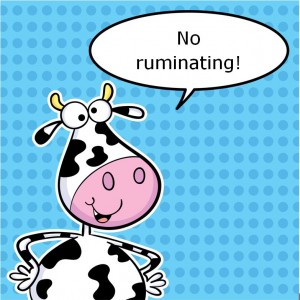Ruminate. From Latin ruminari, to chew the cud.
Ever find yourself going over a problem in your mind again and again and . . . again? Or talking out loud to your friend ad nauseum about some quandary, reviewing the myriad possible solutions until her eyes roll back in her head?
You, dear reader, are ruminating. Like a cow with its cud, you are chewing on something, swallowing it, bringing it back up to chew on it more, swallowing it, bringing it up to chew again . . .
Good for cows, not so good for us
If you’re a cow (a ruminant), ruminating is a good thing. Cud-chewing helps break down the food so the cow can digest it better through the compartments of its stomach.
Humans, though, are missing a vital component of this process when we mentally ruminate. We tend to add on to the problem rather than break it down for better digestion. So you might come up with multiple angles on the problem, a variety of different solutions, or even thoughts about how the whole predicament could spiral out of control and become a big catastrophe.
Is the problem solved? No. Even though you think you are solving the problem by chewing on it endlessly, studies show that ruminators actually have more difficulty solving problems than non-ruminators. Additionally, although ruminators are most likely to say they want social support for help with problem-solving, they are least likely to get it, because people don’t like to be around someone who is ruminating.
So, what to do if you have bovine tendencies and chew your cud a bit too much?
1. Become aware of your ruminating.
You might not even know you are chewing on issues incessantly. Take a minute right now to think about how you usually solve problems. Do you size up the situation succinctly, develop a number of valid solutions, then pick one and solve the issue? Or do you run it around in your mind so much that it keeps you up at night? Do you notice that others get impatient with you or sigh a lot when you’re talking about a problem? It’s possible you are a ruminator.
2. Develop effective problem-solving skills.
One of the problems ruminators have is that they either don’t possess good problem-solving skills in general or they get anxious that the selected solution won’t work. Develop a sound problem-solving strategy such as the one briefly mention in the point above, then take a risk and try just one of the solutions that you have come up with. If it doesn’t work, try another one. But don’t fret about which one to use until you freeze and don’t do anything other than going back to ruminating. The idea is to try to increase your confidence in your ability to problem-solve and to learn that choosing a solution that doesn’t work is not the end of the world.
3. Ask your friends to help.
Pick one or two close friends or family members and ask them to gently point out when you are ruminating. Remember, unlike our friend the cow, ruminating really doesn’t get you anywhere and it can make you feel much worse so it’s not a behavior you want to keep in your repertoire. If you’re having difficulty becoming confident with your problem-solving process, ask your friend to help you develop one that you are comfortable with.
4. Take a tiny risk and try letting go.
You’ve got a death grip on this problem and you’re not going to let go of it until it’s done. As Dr. Phil would say, “How’s that workin’ for ya?”
Ruminating is an attempt to over-control something and I know it’s really scary to let go of control. But just take a tiny risk and let go of it for a set period of time. Tell yourself you’re not going to think about it for an hour. Okay, fifteen minutes. When it pops into your head, take a big breath and let the thought go with the exhale. See how that feels. You might be a little anxious, but notice that the sky didn’t fall even though you weren’t mentally chewing on the problem.
Let’s leave cud-chewing to the cows.
Takeaway points: Ruminating is going over the same thing again and again in your mind to the point of your own distraction and everyone else’s. It’s an attempt to problem-solve by over-controlling that only adds to your misery. Instead, try to become aware of your own brand of cud-chewing and let go a little. Ask your friend or family member to help. You’ll both be glad you did!
Study cited: Murray Law, B. (2005). Probing the depression-rumination cycle, Monitor on Psychology, 36(10), 38. http://www.apa.org/monitor/nov05/cycle.html
Leave a Reply